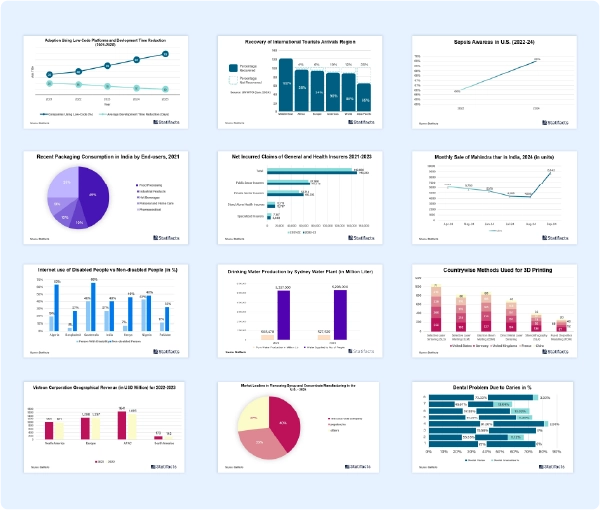The U.S. autoimmune disease diagnostics market size was estimated at USD 2,219 million in 2024 and is projected to hit around USD 3,719 million by 2034, growing at a CAGR of 5.3% during the forecast period from 2025 to 2034.
U.S. Autoimmune Disease Diagnostics Market Report Highlights
- By type, the Localized autoimmune disease diagnostics dominated the market and accounted for a share of 65.1% in 2024.
- By type, the systematic autoimmune disease diagnostics type segment is expected to grow at the fastest CAGR during the forecast period.
- By product, the consumables & assay product segment dominated the growth of the U.S. autoimmune disease diagnostics market in 2024.
- By product, the instruments product segment is expected to grow the fastest during the forecast period.
- By test, the antinuclear antibody (ANA) test segment accounted for a leading market share in 2024.
- By test, the C-reactive protein (CRP) test is expected to grow the fastest during the forecast period.
- By end-use, the hospital end-use segment accounted for the U.S. autoimmune disease diagnostics market with the largest revenue share in 2024.
- By end-use, the clinical laboratories segment is expected to be the fastest-growing during the forecast period.
The U.S. autoimmune disease diagnostics market refers to the production, distribution, and application of autoimmune disease diagnostics in which tests that may be done to diagnose an autoimmune disorder include antinuclear antibody tests. Autoimmune disease is a condition in which the body’s immune system mistakes its healthy tissues as foreign and attacks them. Autoimmunity involves the loss of normal immune homeostasis such that the organism produces an abnormal response to its self-tissue. The hallmark of autoimmune diseases generally involves the presence of self-reactive T-cells, antibodies, and inflammation. Many autoimmune diseases cause inflammation that can affect many parts of the body. The parts of the body affected depend on which autoimmune disease a person has. Immunofluorescence is mainly useful as an initial screening test for those individuals suspected of having an autoimmune disease like amyotrophic lateral sclerosis, rheumatoid arthritis, Sjogren’s syndrome, polymyositis/dermatomyositis, scleroderma, and mixed connective tissue disease.
The growing incidences of autoimmune diseases contribute to the growth of the U.S. autoimmune disease diagnostics market. With conditions like Type-1 diabetes, rheumatoid arthritis, and lupus being more common, there is a higher demand for accurate and early diagnostic tools. The increasing prevalence of autoimmunity, current evidence implicates the momentous alterations in our foods, air pollution, xenobiotics, air pollution, stress, personal lifestyles, infections, and climate change as causes for these increases. Autoimmune tests prove useful for diagnosing and ultimately treating patients with autoimmune diseases and improving the prognosis or mitigating the severity of organ damage. The results can confirm a diagnosis, estimate disease severity, aid in assessing prognosis, and are useful to follow disease activity.
Technological advancements and increasing adoption of lab automation technologies are driving the growth of the U.S. autoimmune disease diagnostics market. Technological advancement benefits for autoimmune disease diagnostics include better learning techniques, increased mobility, facilitated technique, creating new jobs, privacy, competitive edge, communication, better customer experience, enhanced communication and collaboration, encouraged collaboration, increased production, increased innovation, improved communication, and superior information access. Laboratory automation technology benefits include improved data management and analysis, efficient resource use, reduced labor costs, cost savings, reduced human error, faster turnaround time, public health improvement, and facilitated and increased efficiency.
Artificial intelligence (AI) allows early prediction of disease onset in at-risk individuals. Non-invasive markers for diagnosing and monitoring intestinal inflammation. It detects early-stage disease and aids in distinguishing it from other autoimmune conditions. It confirms genetic predisposition and supports diagnostic decision-making. Artificial intelligence-based tools, leveraging advanced machine learning algorithms, can analyze wound images swiftly and provide an accurate assessment. These tools identify infection, evaluate burn depth, and monitor healing progress much faster than traditional methods. AI can reduce variability by providing consistent, data-driven insights, leading to more reliable diagnoses. These new technologies can also provide opportunities to help reduce human error, assist medical professionals and staff, and give patients access to assistance at all hours. As artificial intelligence tools continue to become more sophisticated, there is a potential to use AI even more in reading medical images, X-rays, and scans, diagnosing medical problems, and creating treatment plans. These factors help the growth of the U.S. autoimmune disease diagnostics market.
Supportive government policies for research activities on autoimmune diseases driving the growth of the U.S. autoimmune disease diagnostics market. Supportive government policies offer benefits to improve the rapid advancement and improvement in autoimmune disease research. They provide resources to support collaboration, planning, and innovation and a focus on evaluating the autoimmune disease research portfolio. Government policies can help to create employment opportunities and support entrepreneurship, and they provide a safety net for vulnerable individuals and families, ensuring that they have access to necessities and services.

